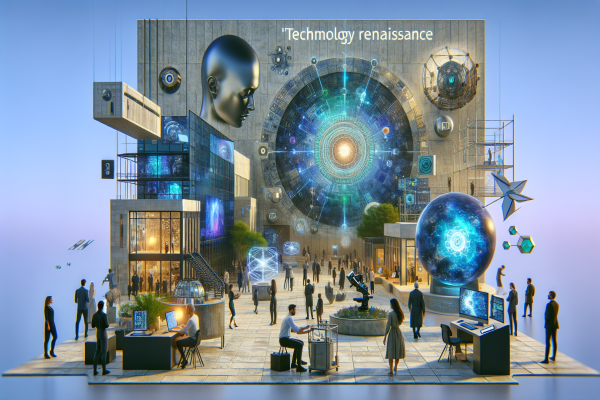
The Tech Renaissance: Unveiling the Next Wave of IT Innovations
Introduction
Imagine a world where technology seamlessly integrates with every aspect of our lives, redefining possibilities and pushing boundaries. This is not just a vision of the future; it's a reality unfolding before us. In this blog, we aim to educate IT professionals and tech enthusiasts about the emerging trends that are poised to revolutionize the tech landscape. We will explore key topics such as AI in creativity, augmented reality in retail, blockchain's impact on cybersecurity, quantum computing in drug discovery, and sustainable tech innovations.
Section 1: The Rise of Artificial Intelligence in Creative Fields
1.1 AI Beyond Automation
Artificial Intelligence (AI) is no longer confined to repetitive tasks and automation. It is now making significant strides in creative fields like art, music, and writing. AI in creativity is about harnessing technology to augment human creativity, offering new tools and perspectives.
1.2 Real-World Applications
Examples of AI in creative fields include OpenAI's GPT-3, which is used for creative writing, and DeepArt, which generates art. These applications demonstrate AI's potential to enhance and expand creative processes [OpenAI, DeepArt].
1.3 Ethical Considerations
As AI becomes more involved in creative processes, ethical considerations arise. Questions about authorship, originality, and the impact on human creativity need to be addressed to ensure responsible use of AI in creativity.
Section 2: The Evolution of Augmented Reality (AR) in Retail
2.1 AR Transforming Shopping Experiences
Augmented Reality (AR) is transforming the retail experience by offering virtual try-ons and interactive displays. This technology allows customers to visualize products in their own environment before making a purchase, enhancing the shopping experience.
2.2 Case Study: IKEA Place App
IKEA's Place App is a prime example of AR in retail. It allows customers to visualize how furniture will look in their homes, making the shopping process more interactive and personalized [IKEA Newsroom].
2.3 Future Prospects
The future of AR in retail is promising, with potential for further personalization and innovation. As AR technology advances, it could revolutionize how we shop, making it more immersive and tailored to individual preferences.
Section 3: Blockchain's Impact on Cybersecurity
3.1 Blockchain Basics in Security
Blockchain technology is being utilized to enhance cybersecurity measures by providing a decentralized and immutable ledger. This technology offers a new level of security that is difficult to breach, making it ideal for protecting sensitive data.
3.2 Use Cases in Cyber Defense
Estonia's blockchain-based e-residency program is a notable example of using blockchain for secure identity verification. This program ensures secure access to services and protects against identity theft [e-Estonia].
3.3 Overcoming Challenges
Despite its potential, blockchain faces challenges in widespread adoption for cybersecurity. Issues such as scalability, interoperability, and regulatory concerns need to be addressed to fully harness its benefits.
Section 4: The Role of Quantum Computing in Drug Discovery
4.1 Quantum Computing Basics
Quantum computing is based on the principles of quantum mechanics, offering unprecedented computational power. This technology holds the potential to revolutionize drug discovery by enabling faster and more accurate simulations of molecular interactions.
4.2 Real-World Impact
Quantum computing is already impacting the pharmaceutical industry. For instance, IBM Research is using quantum computing to accelerate the development of new pharmaceuticals, showcasing its potential in healthcare [IBM Research].
4.3 Future Prospects
The future implications of quantum computing in healthcare are vast. As the technology matures, it could lead to breakthroughs in personalized medicine, allowing for more targeted and effective treatments.
Section 5: Sustainable Tech Innovations for a Greener Future
5.1 Importance of Green Tech
Sustainable technology is crucial in reducing environmental impact and promoting a greener future. Green tech innovations aim to minimize energy consumption and carbon footprint, contributing to a more sustainable world.
5.2 Innovations in Eco-Friendly Tech
Tesla's solar roofs and energy-efficient vehicles are examples of eco-friendly tech innovations. These advancements demonstrate the potential of technology to drive sustainability [Tesla Sustainability].
5.3 Building a Sustainable Tech Ecosystem
Integrating sustainability into tech development requires strategic planning and innovation. By prioritizing eco-friendly practices, the tech industry can contribute significantly to environmental conservation.
Conclusion
In conclusion, the key trends discussed—AI in creativity, AR in retail, blockchain in cybersecurity, quantum computing in drug discovery, and sustainable tech innovations—are set to transform the IT industry. Staying informed and adapting to these innovations is crucial for remaining competitive in this ever-evolving landscape. Embracing change and innovation is not just beneficial; it is essential for thriving in the tech world.
For more insights and solutions on how to integrate these innovations into your business, visit our solutions page.

